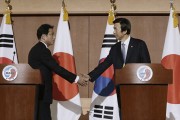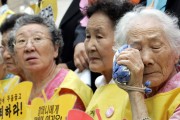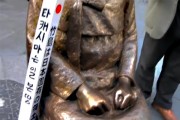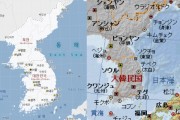Article from Yonhap News:
United States Calls for Japan’s Apology over Comfort Women in Legislative Move that Catches Japan off Guard.

President Barack Obama signs 2014 spending bill on January 17th, 2014.
The bill features a report calling for Japan to apologize for its treatment of comfort women.
In “diplomatic battle” over historical issues in Washington, South Korea has dealt a heavy blow to the Japanese government under Prime Minister Shinzo Abe.
The bill was the first time the comfort women issue [a euphemism for women enslaved to sexually service Japan’s Imperial Army] was present in a bill that went to the White House. Previously, the U.S. House of Representatives adopted a resolution regarding the comfort women in 2007.
The diplomatic community in Washington assesses the ramifications of the clause in the new bill, which only calls for a report without a legally-binding conclusion.
In reaffirming the fact of the Japanese military’s forcible conscription of women as sex slaves, the bill is seen as ratcheting up pressure on Japan to take genuine steps on one of the fractious issues in Northeast Asia. Japane has repeatedly denied the issue.
The bill passed after views critical of Japan emerged in the U.S. Congress following Shinzo Abe’s controversial visit to the Yasukuni Shrine where the war dead of World War II are honored, including Class A war criminals.
Recently Chairman of the Foreign Affairs Committee on the House of Representatives Ed Royce made comments critical of Japan. They were followed by condemnation from Rep. Gerry Connolly (D-VA), co-chair of a group of lawmaker’s knowledgeable about Korea, the Congressional Caucus on Korea, saying “Japan should acknowledge wrongdoings committed against Korea.”
Although the Japanese government has fully mobilized senior officials to seek support from the United States, the effort to win over the U.S., it seems to have inspired a backlash that demands Japan recognize its history and take responsibility.
According to a diplomatic source in Washington, “the latest bill mirrors the U.S. parliamentary stance that seeks to address issues of human rights based on universal values.”
The addition of the comfort women issue to the official bill is attributed to Mike Honda (D-CA) and Steven Israel (D-NY), both of whom played a crucial role behind the curtains. Mr. Honda spearheaded the adoption of the 2007 comfort women resolution.
Legislator Honda said in a commentary posted on his homepage after the bill’s passage, “The congress includes the comfort women issue in a report of the formal bill as part of long-standing effort to deliver justice to those who served as sex slaves in the Second World War.”
Although the bill does not give any legal force to the future report on comfort women, it is anticipated to intensify the psychological pressure on the Obama administration regarding the issue.
Specifically, the report in the bill notes the July 30, 2007 passage of Resolution 121 at the House of Representatives, and calls for the Secretary of State to encourage the Japanese government to address problems raised in the resolution.
The 2007 resolution calls for an official apology from the Japanese government concerning the Japanese army’s forcible conscription of women as sex slaves.
In a nutshell, the bill calls for Secretary of State John Kerry to raise the comfort women issue during dialogue with Japan and diplomatically seek an official apology from the Japanese government about the issue.
Observers say that the Japanese government appears to be ignorant of the inclusion of comfort women issue in the U.S. appropriations bill.
Faced with tough diplomatic pressures from South Korea and China following Abe’s visit to the Yasukuni shrine, the Japanese government is said to be placed in a diplomatic predicament by the bill’s passage.
Diplomatic watchers also say that Vice Minister of Japan’s Foreign Affairs Ministry Nobuo Kishi, younger brother of Prime Minister Abe, has met with State Department officials and U.S. lawmakers in a bid to explain Abe’s shrine visit, which appeared to be greeted with lukewarm responses in Washington.
With the passage in the House of Representatives, the bill is highly likely to move to the U.S. Senate. A ratified bill will be signed into law by President Obama, then affect the policy direction of the Department of State.
In response, Japan is expected to launch a lobby to counteract the bill’s inclusion of the comfort women issue. Yachi Shotaro, appointed as Japan’s newly-created National Security Council Chief, is slated to visit Washington on January 17 for meetings with senior White House officials and Secretaries of Defense and State.

Japanese Prime Minister Shinzo Abe steps inside the Yasukuni Shrine on Dec. 26th, 2013.
The visit sparked a barrage of condemnations from South Korea and China.

Comfort women pay homage to deceased victims at a makeshift altar in front of Japanese Embassy in South Korea. Many of comfort women, now at advanced ages, passed away, with only 56 victims alive at present.
Comments from Naver:
kowo****:
If the Japanese are human beings, they will apologize to the victims. But if they are monkeys, they will not.
kdc0****:
Justice will prevail. Japan should look squarely at their past, tsk tsk.
kosu****:
Abe prompts Japan’s isolation by moving to become a military power in the region. Nostalgia toward their militaristic past and their anxiety about vulnerable geography make them show their true colors. But that will only make them more isolated.
kyys****:
This is the first time when it looked to me like the United States has done justice to its name. As a strong power, the United States behaves accordingly. They did a good job.
moon****
Mike Honda is an American of Japanese descent. I thank him a lot for his role in drafting and passing the bill.
tjrg****:
By the way, why have we not raised issues other than comfort women? Such as the unjustifiable massacre and experiments on humans? How come we have only raised the issue of comfort women? There should be an apology for other brutalities committed by Imperial Japan.
mss0****:
Monkeys, oblivious to history, will not get any bananas.
moro****:
Our government officials should learn from the passage of the landmark bill. You guys may feel good because others do your job. Or are you nervous about showing your pro-Japan true colors?
sjki****:
As a third generation Japanese American, Rep. Mike Honda is a congressman who has dedicated himself to rectify past misdeeds of Japanese ancestors and misguided history education in Japan. Hopefully, the South Korean public will support his efforts.
haae****:
Japan always complains that the Pacific War could have been won by them if the United States had not played dirty. Like they were the victim while the U.S. was the aggressor. Japan ceaselessly barks, saying that it has historically advocated peace.
ther****:
Japan walks on a path toward becoming a global pariah. They conducted experiments on people from Korea, China and Russia during their invasion into the three countries. Would it be possible to deal a blow to Japan in collaboration with all three of these countries? Japan is on bad terms with its neighboring three countries.
onok****:
Abe’s worship at the Yasukuni Shrine and subsequently swelling approval ratings for Abe, Japan’s denials of its invasion and forcibly drafted comfort women, their misguided historical claims, outrageous sovereignty claims over the islets of Dokdo, growing anti-Korean sentiment in Japan. All of these illustrate their nostalgia toward their past imperialistic days and their ulterior motive of invading the neighboring countries in the region. Decades after the end of war, they still remain brazen and cruel.

Conscripted women are shown in the picture. Some high-profile Japanese politicians have repeatedly denied the responsibility for inhumane wrongdoings committed against women in neighboring countries.
Comments from Daum:
에이미크래프트:
Since our nation’s power is lacking, it’s like we are incapable of punishing the bully and just wait for our strong friend to get them.
구라치네:
A triumph of diplomacy? The bill’s passage is thanks to demonstrations in front of the Japanese Embassy in South Korea every Wednesday for 22 years and the Butterfly Project. I doubt the current government played any diplomatic role in this. The incumbent government even supports the endorsement of a history textbook by the publishing company Kyohaksa. [Note: A history textbook released by textbook publisher Kyohaksa has recently stirred up national controversy as it contains what some conservatives claim to be a balanced historical perspective, a view that leftists label a pro-Japanese viewpoint because of its relatively favorable description of Japanese activities during Japan’s colonial dominance of the Korean Peninsula.]
불똥이님:
A Kyohaksa history book says that in many cases, women were “called up” for sexual enslavement. This description also means that some of the women volunteered for prostitution for the Japanese army. Comfort women were forced to deal with ten Japanese soldiers or more per day, came down with sexually transmitted diseases, and hardly got food on the battlefields, much less got paid. Does the textbook cover the whole story?
팅이:
Thank you, Mike Honda.
와치맨:
Even the United states did the right thing. Kyohaksa, a Korean textbook publishing company, said in its latest history textbook that comfort women accompanied the Japanese army voluntarily. The education ministry in our country even accredited the textbook. How ridiculous is this?
삼식이:
It’s shameful that the South Korean mainstream is still dominated by the descendants of pro-Japanese collaborators. For one thing, President Park Geun-hye is the daughter of general-turned-president Park Chung-hyee, who served as a Japanese army officer in his youth, hunting for independence fighters. The nation is still affected by distorted pro-Japanese textbooks.







